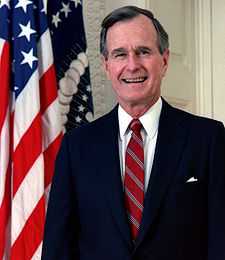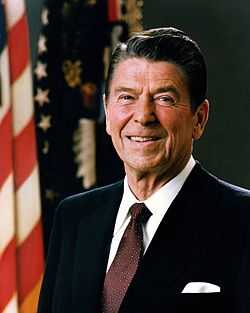Nicholas F. Brady
| Nicholas F. Brady | |
|---|---|
 | |
| 68th United States Secretary of the Treasury | |
| In office September 15, 1988 – January 17, 1993 | |
| President | Ronald Reagan George H. W. Bush |
| Preceded by | James Baker |
| Succeeded by | Lloyd Bentsen |
| United States Senator from New Jersey | |
| In office April 20, 1982 – December 27, 1982[1] | |
| Appointed by | Thomas Kean |
| Preceded by | Harrison A. Williams |
| Succeeded by | Frank Lautenberg |
| Personal details | |
| Born | Nicholas Frederick Brady April 11, 1930 New York City, New York |
| Nationality | American |
| Political party | Republican |
| Spouse(s) | Katherine Douglas "Kitty" Brady (m. 1954 - present day) |
| Children | 4 |
| Alma mater | Yale University Harvard Business School |
| Signature | |
Nicholas Frederick Brady (born April 11, 1930) is an American politician from the state of New Jersey, who was the United States Secretary of the Treasury under Presidents Ronald Reagan and George H. W. Bush, and is also known for articulating the Brady Plan in March 1989. In 1982, he was appointed to succeed Harrison A. Williams as a United States Senator until a special election could be held. He served in the Senate for 8 months.
Early life
Brady was born in New York City, the son of James Cox Brady, Jr., and his wife, Eliot Chace. He was named for his paternal great-uncle, Nicholas Frederic Brady.[2] His great-grandfather was industrialist Anthony N. Brady. He grew up on an estate in Far Hills, New Jersey.[3] He was educated at Yale University (B.A., 1952), where he was a member of Chi Psi Fraternity. He received his M.B.A. from Harvard University in 1954.
Career
Brady's political career began when he was appointed by Governor Thomas Kean as a Republican Senator from New Jersey to fill the vacancy caused by the resignation of Harrison A. Williams, Jr. He served from April 27, 1982 through December 27, 1982 and did not seek election to a full term. During his time in the Senate he was a member of the Armed Services Committee and the Banking, Housing and Urban Affairs Committee.
In 1984 Reagan appointed Brady to be Chairman of the President's Commission on Executive, Legislative and Judicial Salaries. He also served on the President's Commission on Strategic Forces (1983), the National Bipartisan Commission on Central America (1983), the Commission on Security and Economic Assistance (1983), and the Blue Ribbon Commission on Defense Management (1985). He also chaired the Presidential Task Force on Market Mechanisms in 1987.
Brady became the 68th Secretary of the Treasury on September 15, 1988, and served during the last four months of Ronald Reagan's presidency and resigned just three days before Bill Clinton was to take office. In 1989, after a period of years in which a number of developing countries, including Mexico, defaulted on their international debt, he developed the Brady Plan to help them sell dollar-denominated bonds. These became known as Brady Bonds.
During his tenure as Treasury Secretary, the New York Times wrote that Brady was "bland on television and awkward as a public speaker."[4]
He is a former Chairman of the Board of Dillon Read & Co. Inc. (investment banking) (1970–1988) and a former Chairman of Purolator, Inc. (filtration products) (1971–1987).
Brady's career in the banking industry spanned 34 years. He joined Dillon, Read & Co. in New York City in 1954, rising to Chairman of the Board. He has been the Chairman of Darby Overseas Investments, Ltd. and Darby Technology Ventures Group, LLC, investment firms, since 1994. Mr. Brady is Chairman of Franklin Templeton Investment Funds (an international investment management company), a director of Hess Corporation (an exploration and production company) and Holowesko Partners Ltd. (investment management companies). He is also a director of the oilfield services company Weatherford International since 2004. He has been a Director of the NCR Corporation, the MITRE Corporation, and the H.J. Heinz Company, among others. His father had been a major figure in Thoroughbred horse racing both in the United States and in Europe. Although never involved with the sport at the same level as his father, Nicholas Brady served for a time as chairman of The Jockey Club. Mill House (Stable) is the nom-de-course for Brady's racing operation.[5]
He has also served as a trustee of Rockefeller University and a member of the Board of the Economic Club of New York. He is a member of the Council on Foreign Relations, Inc and a former member of the Steering Committee of the Bilderberg Group.[6] He is a former trustee of the Boys' Club of Newark.
Personal life
Nicholas F. Brady and his wife, the former Katherine Douglas (known as Kitty), have four children.
References
- ↑ States in the Senate - New Jersey's United States Senators
- ↑ A Son to Mrs. James Cox Brady Jr., NYTimes.com; accessed March 29, 2015.
- ↑ Quint, Michael. "The Financier 'Who Knows What Is Going On'", The New York Times, August 6, 1988; accessed November 27, 2007. "The great grandson of Anthony N. Brady, an Irish emigrant who was a friend and business associate of Thomas A. Edison, Nicholas Brady grew up on a large estate in Far Hills, N.J., that borders on the Dillon family estate."
- ↑ Rosenbaum, David (19 November 1989). "The Treasury's 'Mr. Diffident'". New York Times. Retrieved 9 October 2014.
- ↑ Woodbine Entertainment – Retrieved June 26, 2011
- ↑ "Former Steering Committee Members". bilderbergmeetings.org. Bilderberg Group. Retrieved 2014-02-08.
| United States Senate | ||
|---|---|---|
| Preceded by Harrison A. Williams |
U.S. Senator (Class 1) from New Jersey 1982 Served alongside: Bill Bradley |
Succeeded by Frank Lautenberg |
| Political offices | ||
| Preceded by James Baker |
U.S. Secretary of the Treasury Served under: Ronald Reagan, George H.W. Bush 1988–1993 |
Succeeded by Lloyd Bentsen |
| ||||||||
| ||||||||||||||||||||||||||||||||||||||||||||||||||||||||||||||||||||||||||||||||||||||||||||||||||||||||||||
| ||||||||||||||||||||||||||||||||||||||||||||||||||||||||||||||||||||||||||||||||||||||||||||||||||||
|



